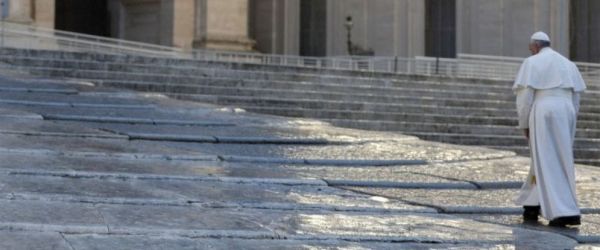"Contento, Señor, contento!": the smiling face of a contemporary saint, Chilean Alberto Hurtado, who even in difficulties and suffering assures the Lord that he is "happy", contrasted with the "saddened" face of the evangelical "rich young man" in Pope Francis' meditation during the Mass celebrated at Santa Marta on Tuesday 28 February. These are the two ways of responding to the gift and proposal of life that God makes to man and that the Pontiff summed up with an expression: "Everything and nothing".
Francis' homily began with a consideration of the liturgy of these "three last days before Lent" in which the "relationship between God and riches" is presented. In Sunday's gospel, he recalled, "the Lord was clear: one cannot serve God and riches. You cannot serve two masters, two lords: either you serve God or you serve riches'. On Monday, however, "the story of the rich young man was proclaimed, who wanted to follow the Lord but in the end was so rich that he chose riches". A Gospel passage (Mark 10:17-27) emphasised Jesus' warning: "How difficult it is for a rich man to enter the kingdom of heaven. It is easier for a camel to go through the eye of a needle", and the disciples' reaction "somewhat frightened: "But who can be saved?"".
On Tuesday, the liturgy continued to propose the passage from Mark by examining the reaction of Peter (10:28-31), who says to Jesus: "All right, what about us?". It almost seems, the Pope commented, that Peter with his question - "Behold, we have left everything and followed you. What is our turn?" - was presenting "the bill to the Lord", as in a "business negotiation". In reality, the Pontiff explained, that was probably 'not Peter's intention', who evidently 'did not know what to say: "Yes, this one has left, but what about us?"'. In any case, "Jesus' answer is clear: 'I tell you, there is no one who has left everything without receiving everything'". There are no half-measures: 'Behold, we have left everything', 'You will receive everything'. Instead, there is "that overflowing measure with which God gives his gifts: 'You will receive everything. There is no one who has left home or brothers or sisters or mothers or fathers or children or fields for my sake and for the sake of the gospel, who does not already receive a hundred times as much now in this time in homes, brothers, sisters, mothers, fields, and eternal life in the time to come'. Everything'.
This is the answer, said the Pontiff: "The Lord does not know how to give less than everything. When he gives something, he gives himself, which is everything'.
An answer, however, where a word emerges that "makes us reflect". Jesus in fact affirms that one "receives already now in this time a hundred times in houses, brothers together with persecutions". So "everything and nothing". The Pope explained: "Everything on the cross, everything in persecutions, together with persecutions". Because it is a matter of "entering into another way of thinking, another way of acting". In fact "Jesus gives himself everything, because the fullness, the fullness of God is a fullness annihilated on the cross". Here then is the "gift of God: the fullness annihilated". And here then is also "the style of the Christian: to seek the fullness, to receive the annihilated fullness and to follow along that path". Certainly a commitment that "is not easy".
But the Pope, following his meditation, went further and asked himself: "What is the sign, what is the signal that I go ahead in this giving everything and receiving everything?". What is the sign, in short, that one is on the right path? The answer, he said, is found in the first reading of the day (Sirach 35: 1-15), where it is written: "Glorify the Lord with a glad eye. In every offering show thy countenance glad, with joy consecrate thy tithe. Give to the Most High according to the gift you have received from him and with a glad eye according to your will'. Therefore, "contented eyes, glad countenance, joy...". The Pontiff explained: "The sign that we are going on this road of everything and nothing, of fullness annihilated, is joy". It is no coincidence that "the rich young man turned dark in the face and went away saddened". He had not been "able to receive, to welcome this annihilated fullness". Instead, the Pope explained, 'the saints, Peter himself, welcomed it. And in the midst of trials, of difficulties they had a joyful face, a contented eye and a joyful heart. This is the sign'.
And it was at this point that the Pope resorted to an example taken from the life of the contemporary Church: "A little phrase from a saint, Saint Alberto Hurtado, Chilean, comes to mind," he said. He always worked, difficulties behind difficulties, behind difficulties.... He worked for the poor'. He is a saint who 'was persecuted' and had to face 'many sufferings'. But 'when he was right there, crushed on the cross' he would say: 'Happy, Señor, happy, Lord, happy''.May Saint Albert, the Pontiff concluded, "teach us to go on this road, give us the grace to go on this somewhat difficult road of everything and nothing, of the annihilated fullness of Jesus Christ and always say, especially in difficulties: 'Happy, Lord, happy'".
[Pope Francis, in L'Osservatore Romano 01.03.2017]












